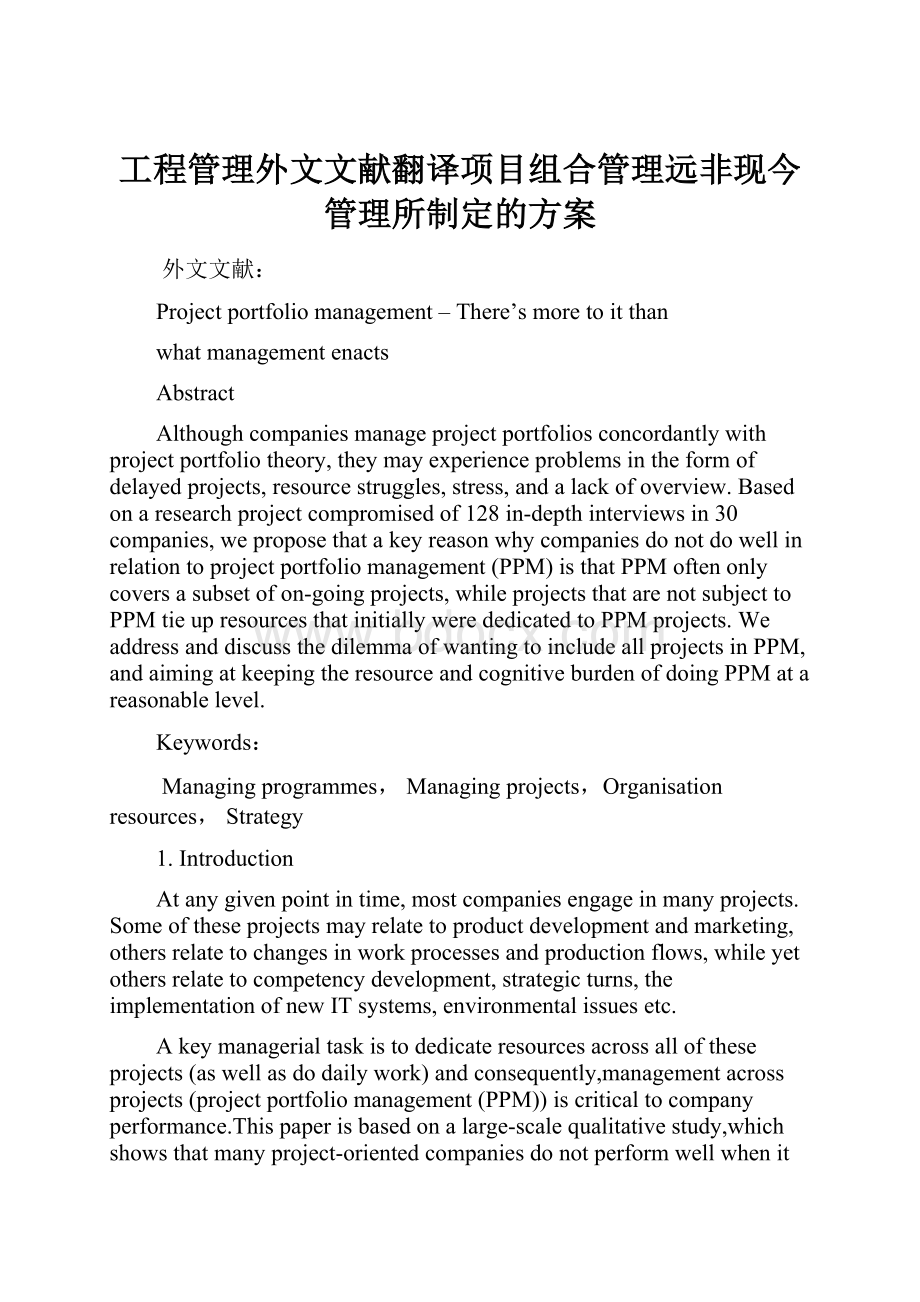工程管理外文文献翻译项目组合管理远非现今管理所制定的方案.docx
《工程管理外文文献翻译项目组合管理远非现今管理所制定的方案.docx》由会员分享,可在线阅读,更多相关《工程管理外文文献翻译项目组合管理远非现今管理所制定的方案.docx(12页珍藏版)》请在冰豆网上搜索。

工程管理外文文献翻译项目组合管理远非现今管理所制定的方案
外文文献:
Projectportfoliomanagement–There’smoretoitthan
whatmanagementenacts
Abstract
Althoughcompaniesmanageprojectportfoliosconcordantlywithprojectportfoliotheory,theymayexperienceproblemsintheformofdelayedprojects,resourcestruggles,stress,andalackofoverview.Basedonaresearchprojectcompromisedof128in-depthinterviewsin30companies,weproposethatakeyreasonwhycompaniesdonotdowellinrelationtoprojectportfoliomanagement(PPM)isthatPPMoftenonlycoversasubsetofon-goingprojects,whileprojectsthatarenotsubjecttoPPMtieupresourcesthatinitiallywerededicatedtoPPMprojects.WeaddressanddiscussthedilemmaofwantingtoincludeallprojectsinPPM,andaimingatkeepingtheresourceandcognitiveburdenofdoingPPMatareasonablelevel.
Keywords:
Managingprogrammes,Managingprojects,Organisationresources,Strategy
1.Introduction
Atanygivenpointintime,mostcompaniesengageinmanyprojects.Someoftheseprojectsmayrelatetoproductdevelopmentandmarketing,othersrelatetochangesinworkprocessesandproductionflows,whileyetothersrelatetocompetencydevelopment,strategicturns,theimplementationofnewITsystems,environmentalissuesetc.
Akeymanagerialtaskistodedicateresourcesacrossalloftheseprojects(aswellasdodailywork)andconsequently,managementacrossprojects(projectportfoliomanagement(PPM))iscriticaltocompanyperformance.Thispaperisbasedonalarge-scalequalitativestudy,whichshowsthatmanyproject-orientedcompaniesdonotperformwellwhenitcomestoPPM.Thisrelatestotheinabilitytoaccomplishprojectsthatareinitiated.Inparticular,weidentifythefollowingproblems:
(1)Projectsarenotcompletedaccordingtoplan(ortheyevenpeteroutduringtheirprojectlifecycle);
(2)Managementandemployeesfeeltheylackabroadoverviewofon-goingprojects(especiallywhenthenumberofon-goingprojectsincreasesasmoreandmoreprojectsarenotcompletedaccordingtoplan);
(3)Peopleexperiencestressasresourcesarecontinuouslyreallocatedacrossprojectsinordertomakeendsmeet.
Theseobservationsareespeciallyinterestingbecausethecompanieswereincludedintheresearchprojectbecausetheyweresupposedtobeespecially,experiencedinPPM,andbecausetheyactuallyengageinPPMaccordingtotheextantbodyofliteratureonPPM.Forexample,partofthecompanies’PPMincludedanefforttopickthebestprojectsonthebasisofexplicitorimplicitcriteria,andanefforttoallocatesufficientresourcestotheseprojects.
However,despiteefforts,topractice‘good’PPM,thesecompaniesexperiencesevereproblemsinrelationtoPPM–especiallyinlettingenoughresourcesgointothe‘right’projects.ThepurposeofthispaperistoconfrontPPMasadvocatedbynormativetheorieswithactualPPMpractices.Hence,thepurposeistoconfrontPPMtheorieswithPPMasperceivedbymanagersandotheremployeesforwhomPPMispartof,oraffects,theirworkconditions.
However,inthispaper,wearemoreinterestedinPPMasenactedbycompaniesthaninuniversallytrueperceptions.Hence,weadheretoWeick’s[1–3]notionofenactmentasthepreconceptionsthatareusedtosetasideaportionofthefieldofexperienceforfurtherattention.InregardtoPPM,enactedprojectsarethustheonesmanagementsetsasideforfurtherattention(i.e.PPM).Assuch,wefocusespeciallyonwaysactorsdefineorenactprojects[4]andmakesenseofhowtomanagethesumoftheprojects.Drawingonthisperspective,weaccountforfindingsthatsuggestwhycompaniesthatdoengageinPPMstillexperienceproblems.
2.Projectportfoliotheory
ThispaperdrawsonArcherandGhasemzadeh’s[5,p.208]definitionofprojectportfoliosas‘‘agroupofprojectsthatarecarriedoutunderthesponsorshipand/ormanagementofaparticularorganization’’.Henceforth,wedefinePPMasthemanagerialactivitiesthatrelateto
(1)theinitialscreening,selectionandprioritisationofprojectproposals,
(2)theconcurrentreprioritisationofprojectsintheportfolio,
(3)theallocationandreallocationofresourcestoprojectsaccordingtopriority.
Forquitesometimeresearchershavesuggestedthatlowcompletionratesfornewproductdevelopment(NPD)projectsandnewproductfailurerelatetoresourcedeficienciesinkeyareas[6,7].Furthermore,whileahostofresearchers[8–10]havefocusedonthedimensionofPPMthatconcernsprocessesrelatingtoselectionofprojectstobeincludedintheportfolio,researche.g.[11]alsoincreasinglyfocusesontheday-todaymanagementoftheprojectportfolio.
3.Methodology
Overaperiodoftwoyears,wedidempiricalresearchonhowcompaniesmanagetheirentirerangeofprojects,e.g.renewalprojects,strategicprojects,ITprojects,departmentallyspecificprojects,andproductionbasedprojects.Inrelationtotheselectionofcompaniestobeincludedintheempiricalstudy,akeycriterionwasthatthestudyshouldcoverawidevarietyofindustries.Asaresult,theempiricalstudycovers30companiesfromindustriesasdiverseas,e.g.mobiletelephonecommunications,finances,energy,pharmaceuticals,toys,software,andfoods.
However,duetothefactthatwewerelookingforcompanies,wheretheamountofon-goingprojectssuggestedtheywereengagedinPPM,thestudyisbiasedtowardslargercompaniesaswellascompaniesthatdefineatleastasubstantialpartoftheiractivitiesasprojects.Thedegreetowhichthecompaniesparticipatedinthestudyvaries.Hence,halfofthecompaniesarelabelled‘innercircle’companiesduetothefactthatwedrewextensivelyonthese15companies.Forexample,inthesecompaniesmoreinterviewswereconductedatvariouspointsintimeandatvariousorganizationallevels.Hence,alongitudinalperspectivecharacterizestheinvolvementofthesecompanies.
Theremaininghalfofthecompaniesarelabelled‘outercircle’companiesbecausetheirparticipationinthestudyhasincludedfewertop-managementinterviews,thepurposeofwhichwastogaininsightintowaysinwhich(top)managementdefinesthecontentoftheirprojectportfoliosandmanagesthem.
4.Managerialimplications
Akeyfindingisthatthegapbetweenrequiredandavailableresourcesisverymuchattributabletotheexistenceofahostofsmallerprojectsthatneverbecomepartofenactedprojectportfolios.Thus,atanaggregatedlevel,theempiricalstudysuggestssmaller,un-enactedprojectsqualifyasresourcescrunchersinsofartheyarenotconsideredtobeapartofenactedprojectportfolios.Inordertoovercomethiscrunchinresources,twosolutionsseemobvious:
(1)Enactingmore,i.e.havingPPMembraceallprojects.
(2)Allocatingmoreresourcestoapoolofloosely-controlledresourcesfortheun-enactedprojectstodrawon.
5.Researchimplications
Theempiricalstudyelaboratesonthe‘‘significantshortageofresourcesdevotedtoNPD’’thatCooperandEdgettargueisthefundamentalproblem‘‘thatplaguesmostfirms’productdevelopmentefforts’’.
Ourworkespeciallysuggeststhattheshortageofresourcesdevotedtoenactedprojectsisnotaproblemthatprimarilyarisesinrelationtotopmanagement’sPPM.Onthecontrary,in-good-faithtopmanagementdedicatesresourcestoenactedprojectsonthebasisofsoundPPM.However,whattopmanagersdonotdoistakeintoaccountthehostofsmallerprojectsthatindividualsinitiateand–moreimportantly–topmanagersignore(oratleastheavilyunder-estimate)theamountofresourcesthatthesesmallerprojectstieup.Hence,wearguethatespeciallythecrunchinresourcesmaybeattributabletotheun-enactedcompetitionforresourcesthatsmallerprojectssubjectenactedprojectsto.
Consequently,thekeycontributionofourempiricalworktoresearchisthatitemphasisesthatifwewishtostudyPPM(andespeciallyifwewishtorelatePPMtoprojectperformance),wemightbebetterofftakingintoaccounttheentirerangeofprojectsthatactual(notenacted)portfoliosarecomprisedof.Thus,ifweasresearchersonlyenacttheprojectsthatareneatlylistedbytopmanagement,thenourresearchwillneglectthehostofprojectsthatarenotsubjecttoPPM,projectsthatnonethelesstakeupvaluable,andscarce,resources.
Thefactthattheempiricalstudyincludesinterviewswithmanagers,i.e.thosewhodoPPM,andinterviewswithpersonnelatlowerorganisationallevels,i.e.thosewhoseworkissubjecttoPPM,isthereasonwhywewereabletoidentifyun-enactedprojects.Thus,researchersinterestedinPPMshouldbecarefulnottorelytooheavilyonamanagementperspective.
6.Conclusionandlimitations
Themainconclusionisthataslongassomeprojectsareun-enacted,companiesmayexperienceadrainonresourcesthatreducesthetimeandresourcesactuallydevotedtoprojectssubjecttoPPM.Hence,eachindividualcompanyshoulddecidewhetherornotallprojectsshouldbepartofPPMandiftheendresultofsuchadecisionisnottomakecomprehensiveprojectlists(i.e.liststhatincludeallminorprojects),thenmanagementshoulddecidehowmanyresourcesshouldbesetasidefortheplethoraofsmallprojectsthatdonotappearontheprojectlist.
Onewayinwhichthecrunchinresourcescanbereducedisbyensuringthatsmallerprojectsdonottakeupacriticalportionoftheresourcesthatare–officially–setasideforthecompletionofprojectssubjecttoPPM.However,duetotheexploratorynatureofthestudyaccountedforinthispaper,ourfindingsrelatefarmoretowhatcompaniesactuallydo(positivetheoryinHunt’sterms),ratherthantowhattheyoughttodo(normativetheoryinHunt’sterms).Althoughgenerating